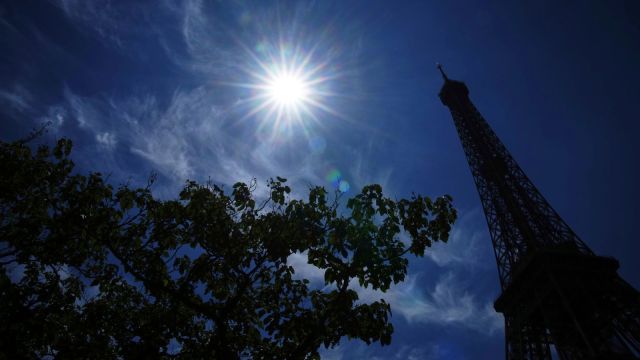Over 2 dozen Indians among 650 experts picked to write next IPCC report
The IPCC assessment reports, or ARs, are the most comprehensive contemporary scientific understanding of the planet’s climate system, the changes it is undergoing, and the impact it is having on the Earth and its inhabitants.
 These reports are produced in a five to seven years cycle and represent the state of knowledge of the climate system at that time.
These reports are produced in a five to seven years cycle and represent the state of knowledge of the climate system at that time.More than two dozen Indian scientists and researchers are in the list of over 650 experts chosen to write the seventh assessment report of Intergovernmental Panel on Climate Change (IPCC), which is expected to be published in 2029.
The IPCC assessment reports, or ARs, are the most comprehensive contemporary scientific understanding of the planet’s climate system, the changes it is undergoing, and the impact it is having on the Earth and its inhabitants. These reports are produced in a five to seven years cycle and represent the state of knowledge of the climate system at that time. The different parts of the sixth assessment report, or AR6, were released between 2021 and 2023.
Like previous reports, the AR7 would comprise of three working groups, each producing a report of its own — Working Group I on the physical science basis of climate change, Working Group II on impacts, adaptation and vulnerability, and Working Group III on mitigation of climate change.
There are nine Indian scientists and researchers in Working Group I and III and eight Working Group II. These include a few Indians working in other countries. Several of these have contributed to previous assessment reports as well.
Three scientists from Pune-based Indian Institute of Tropical Meteorology, which hosts a Centre for Climate Change Research, are part of the group, the highest among Indian institutions. The Indian Institute of Science, Bengaluru, and the Indian Institute for Human Settlements (IIHS), has two people in the list.
A similar number of Indians, in the range of 20-30, have been part of the earlier assessment reports. The contributors to the assessment reports are initially nominated by country governments, which can propose as many names as they like. The IPCC then makes the final selection based on their expertise and contribution to science, while also ensuring gender balance, and adequate representation to every region.
This time, countries had proposed 3,771 nominees, of which 664, representing 111 different countries, were finally selected. IPCC said more than 50 per cent of the selected authors were from developing countries, and about 46 per cent were female. The AR6 contributors came from 90 countries. Of these, 44 per cent came from developing countries, and 33 per cent were women.
The IPCC authors do not produce any new science. They review all the available published literature on the subject, and synthesises the information contained therein to produce a comprehensive state of knowledge on specific issues related to climate change. The IPCC assessment reports have been the basis for climate negotiations for the last three decades, and all the climate actions being taken worldwide. For its fourth assessment report, which came out in 2007, the IPCC was awarded the Nobel Peace Prize, for the important work it was doing in safeguarding the planet.
Apart from the three working group reports, the AR7 cycle would also produce a special report on how climate change was impacting cities. The selected authors will begin their work on AR7 later this year, with the first meeting of lead authors scheduled in Paris in November.
Here’s a list of the Indians involved:
| Working Group | Scientist/Researcher | Institute |
| WG-I | Srikanthan Ramachandran | Physical research Laboratory, Ahmedabad |
| WG-I | Swapna Panickal | Indian Institute of Tropical Meteorology, Pune |
| WG-I | Ashwin Seshadri | Indian Institute of Science, Bengaluru |
| WG-I | Vimal Mishra | IIT Gandhinagar |
| WG-I | Roxy Mathew Koll | Indian Institute of Tropical Meteorology, Pune |
| WG-I | Ayantika Dey Choudhury | Indian Institute of Tropical Meteorology, Pune |
| WG-I | Bala Govindasamy | Indian Institute of Science, Bengaluru |
| WG-I | Shipra Jain | University College London |
| WG-I | Sheeba Nettukandy Chenoli | Universiti Malaya Malayasia |
| WG-II | Samraj Kumar Sahay | Independent adaptation researcher, affiliated with International Platform on Adaptation Metrics |
| WG-II | Ritu Bhardwaj | International Institute for Environment and Development |
| WG-II | Jagdish Krishnaswamy | Indian Institute of Human Settlements, Bengaluru |
| WG-II | Mahesh Sankaran | National Centre for Biological Sciences, Bengaluru |
| WG-II | Rajiv Kumar Chaturvedi | BITS Pilani, Goa Campus |
| WG-II | Naresh Kumar Soora | Indian Agricultural Research Institute |
| WG-II | Chandni Singh | Indian Institute of Human Settlements, Delhi |
| WG-II | Aditi Mukherjee | CGIAR (Agriculture research centre), Kenya |
| WG-III | Vaibhav Chaturvedi | Centre for Energy, Environment and Water, Delhi |
| WG-III | Shonali Pachauri | International institute for Applied Systems Analysis, Austria |
| WG-III | Minal Pathak | Ahmedabad University |
| WG-III | Purnamita Dasgupta | Institute for Economic Growth, Delhi |
| WG-III | Joyashree Roy | Jadavpur University |
| WG-III | Rubal Dua | Saudi Arabia KAPSARC |
| WG-III | Parth Sarathi Mahapatra | ICIMOD, Nepal |
| WG-III | Arti Bhatia | Indian Council for Agicultural Research |
| WG-III | Saritha Vishwanathan | IIM Ahmedabad |







